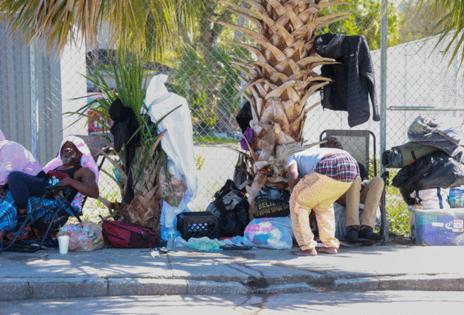Instead of arrests, could Central Florida turn to homeless court?
Published in News & Features
ORLANDO, Fla. — Amid fears that a new state law criminalizes those who sleep outside, Central Florida leaders are coalescing around a diversion program to waive court sentences for people experiencing homelessness in exchange for pursuing treatment, housing and employment.
Such a program is called a homeless court and could apply to unsheltered residents who are frequently arrested for violations like public urination, disorderly conduct or public sleeping. They often are unable to pay the associated fine, and arresting them only creates more barriers to getting back on their feet.
Under some models of the program, a homeless court judge could drop charges if someone takes concrete steps to end their homelessness.
The concept — in place in a handful of Florida cities and a few dozen municipalities across the country — has gained traction among many local activists and officials as a productive way to address the challenges of homelessness.
“I think it’s probably going to happen,” said Eric Gray, executive director of the Christian Service Center. “It makes sense from the standpoint of you’re dealing with a lot of very low-level offenses and it’s a huge portion of the court docket.”
The proposal comes against the backdrop of Florida’s new homeless law, which requires local governments to enforce bans on camping in public places. Law enforcement agencies worry they may be forced to arrest many more homeless people, increasing the burden on courts and jails to which Gray refers.
A homeless court can’t provide shelter to those who need it — Central Florida cities and counties continue to face an urgent need to create more shelter beds — but it can help people take advantage of the options that exist.
Such a program would likely exist outside of a traditional courtroom, though it would still have a judge, public defender, prosecutor, and other features of a typical legal process.
Gray offered up his Parramore campus to host the program as often as weekly.
Orlando City Commissioner Shan Rose, an early backer of the idea, has pitched it to be held at Orange County’s Work Release Center, which city officials are assessing as a potential homeless shelter.
She said such a diversion program would reduce recidivism.
“It equates the dollars into sweat equity … with the ultimate goal of finding housing,” she said, noting the court’s “sentences” could include drug and alcohol rehab, or job training.
A city spokeswoman said Orlando hasn’t yet looked into using the Work Release Center in part for a homeless court, but is interested in exploring the idea.
“Lisa Portelli, the City’s Homelessness Services Advisor has reviewed programs around the country and has seen the positive impact a homeless court has in other cities,” said Andrea Otero, a city spokeswoman. “While the city would not be the one to establish the homeless court, we are certainly open to exploring this option with community and government partners.”
The city gained control over the Work Release Center in a sweeping deal with Orange County, that covered a host of issues from annexing ranchland to processing recyclables. Rose, who first pitched the idea as a city employee in 2019, attended a meeting convened by State Attorney Andrew Bain in September to discuss setting up such a court, an idea he supported as an alternative to jailing people.
“We have to make sure that there are different solutions,” he told Spectrum News 13. “Every option is on the table to address this issue.”
Since then, Bain lost his bid for election to Monique Worrell. It’s unclear where Worrell stands on the homeless court idea – she didn’t return a text message about it.
Homeless courts take a variety of forms across the nation but typically handle the kind of low-level offenses people experiencing homelessness face. In the past, police sometimes looked the other way when people camped in public spaces, but the state’s new law makes that more difficult, by creating a legal process for complaining parties to induce police to enforce camping bans.
In Orlando, low-level municipal violations come with penalties of up to 60 days in jail and a fine of up to $500. A person without a roof over their head is unlikely to have the means or the inclination to pay that fine, Gray said.
“The idea of a fine isn’t a deterrent because they’re not being collected,” he said.
Those offenses are spiking in the region, as homelessness sharply increases and severe shortages of affordable housing and shelter beds leave few options for people without a place to sleep.
Prior to 2023, about five people per day were arrested for municipal violations, a figure that has climbed to between eight and 15 per day since, said Andrew Sullivan, a UCF researcher studying the issue.
“Even though they apply to everyone in the county, 60 to 70% of the people getting arrested for them are experiencing homelessness,” he said.
The nation’s first homeless court was founded in San Diego, and in a 3-year period it handled nearly 11,000 cases, with about 80% of those cases resolved without a fine issued. Just 16 of those cases resulted in a guilty plea, and in 2021, nearly $1.2 million in fines and fees were waived due to a defendant completing an alternative sentence toward ending their homelessness, according to data from the court.
Others have been set up in places like Miami, Broward County and Sarasota.
Martha Are, the CEO of the Homeless Services Network of Central Florida, said she’d like to see a version in Central Florida.
“Any efforts to ensure that people experiencing homelessness are linked with the most appropriate services and done in a non-punitive way is a really good step,” she said. “I think it’s a good idea in every region.”
--------
©2024 Orlando Sentinel. Visit at orlandosentinel.com. Distributed by Tribune Content Agency, LLC.







Comments